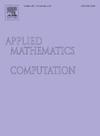具有脉冲效应的二阶非自治进化系统的半分不等式和可控性结果
IF 3.4
2区 数学
Q1 MATHEMATICS, APPLIED
引用次数: 0
摘要
研究了一类复杂动力系统的近似可控性的关键概念:希尔伯特空间中的二阶中立型非自治演化系统。这些系统以固有的记忆效应(由于中性项)和非光滑行为(由半变分不等式建模)为特征,提出了重大的分析挑战。我们首先严格地建立这个复杂系统的温和解的存在性。这一关键步骤依赖于数学工具的强大组合,包括余弦函数、鲁棒不动点技术和广义Clarke子微分,它有效地处理了由半分不等式引起的非光滑性。在此基础上,我们深入研究核心目标:近似可控性。这一基本性质探讨了系统通过明智地选择控制输入来任意接近任何期望的目标状态的能力。我们得到了近似可控性的充分条件,对系统的可控性特性提供了有价值的见解。最后,为了强调我们的理论发现的实际意义,我们提出了一个具体的应用,证明了发展的理论在解决现实世界问题方面的有效性。本文章由计算机程序翻译,如有差异,请以英文原文为准。
Hemivariational inequalities and controllability results for second-order non-autonomous evolution system with impulsive effects
This research investigates the crucial concept of approximate controllability for a class of complex dynamical systems: second-order neutral non-autonomous evolution systems in Hilbert spaces. These systems, characterized by inherent memory effects (due to the neutral term) and non-smooth behavior (modeled by hemivariational inequalities), pose significant analytical challenges. We begin by rigorously establishing the existence of mild solutions for this intricate system. This crucial step relies on a powerful combination of mathematical tools, including cosine functions, a robust fixed-point technique, and the generalized Clarke’s subdifferential, which effectively handles the non-smoothness arising from the hemivariational inequalities. Building upon this foundation, we delve into the core objective: approximate controllability. This fundamental property explores the system’s ability to be arbitrarily close to any desired target state through judicious selection of control inputs. We derive sufficient conditions for approximate controllability, providing valuable insights into the system’s controllability characteristics. Finally, to underscore the practical significance of our theoretical findings, we present a concrete application demonstrating the developed theory’s efficacy in addressing real-world problems.
求助全文
通过发布文献求助,成功后即可免费获取论文全文。
去求助
来源期刊
CiteScore
7.90
自引率
10.00%
发文量
755
审稿时长
36 days
期刊介绍:
Applied Mathematics and Computation addresses work at the interface between applied mathematics, numerical computation, and applications of systems – oriented ideas to the physical, biological, social, and behavioral sciences, and emphasizes papers of a computational nature focusing on new algorithms, their analysis and numerical results.
In addition to presenting research papers, Applied Mathematics and Computation publishes review articles and single–topics issues.

 求助内容:
求助内容: 应助结果提醒方式:
应助结果提醒方式:


